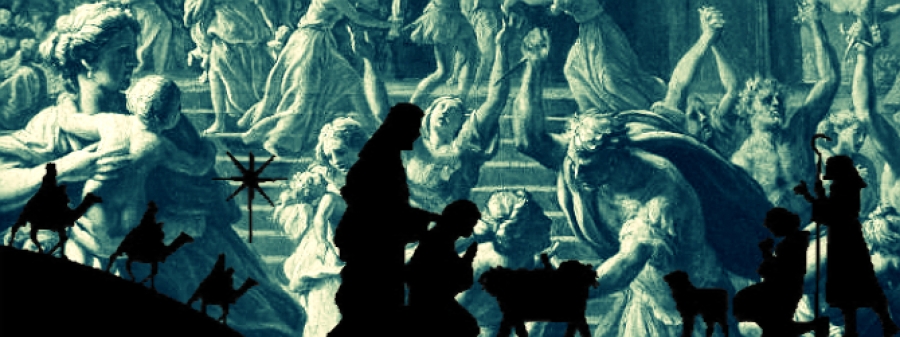At a time where countless numbers of people celebrate Christmas, it is placed upon us the responsibility to preach in and out of season the purpose and intent of the miraculous birth of the Son of God.
Within fellowships, communities and churches the proclamation of the prophet Isaiah will be read in the hearing of many. During this reading many minds will visit the scene of the nativity to reflect upon the baby born in the manger, the appearing of the heavenly host, the visits of the shepherds, the star at night and the wise men from the east.
For some enshrined before them will be the statues of the nativity, whilst for others a theatrical piece played out by ardent followers. This will be followed by music, dancing and merrymaking.
What does nativity mean?
The word nativity means “the event of being born” or the circumstances in which a child is born. Hence the word requires us to consider all the events during the birth of a child.
The reading of Isaiah 9:6 and the record of the nativity found in the gospels of Matthew and Luke provides us a revelation of the events taking place. These events together collectively describe a child being born and a son being given.
Many moons ago whilst reading this text I came upon the revelation which is so clearly distinguished by the prophet Isaiah. This began a journey from the child of the nativity to the son of the nativity. From a childrens story to history.
This meant that the typical characters and props associated with the meaning of the nativity changed from being just the foreground of religious christmas traditions into a sharper picture disclosing the richer understanding of God’s kingdom.
Why would the prophet make two statements about this monumental event? Why in one breath state a child is born and in another a son is given?
Where do we begin?
The Old testament prophecies provide supporting evidence for these distinctions.
Numbers 24:17 states 'I see him, but not now: I behold him, but not near; a Star shall come out of Jacob; a Scepter shall rise out of Israel'
Two sight’s are mentioned, I see him! The first natural and relating to the child's legitimate inheritance within the economy of Israel. I behold him! The second spiritual the revelation of who this child is as the Son of God and chosen King.
The writer goes on to state that what he saw was prophetic, what he wrote was a foretelling of future events. Hence this text would have been part of the inspiration of Isaiah's words.
To begin with we must come to appreciate the words used to introduce the distinctions. “Unto us” forcefully impress the relevancy and impact of the event on we who are in this world.
For whether the child is born or the son is given, both are unto us and drive home our responsibility to respond accurately. No one born from the line of Adam can disassociate themselves from the impact of the fulfillment of prophecy.
In addition the events recorded within the gospels pertaining to the prophecy provide ample guidance and teaching on how to approach the child, the son.
A story told in parts…
The significance of the nativity relates to appreciating all of the events which took place without reducing the narrative to a cliche of theatrical pieces. One thing I have learned is that history does not narrate well and there is a mastery involved in relaying history accurately from one generation to the next.
For many of us we have grown up with the nativity which focuses on the “birth of the child”. This majors on: baby Jesus, Mary and Joseph, manger, angels, shepherds, star, wise men and gifts.
This nativity guided by the limitations of tradition creates an immature view which we haven’t as yet altogether grown up from.
The nativity that reflects the son has an altogether different approach and parallels the exodus and nativity of Moses. This majors upon:
- The occupation of Israel under foreign rule.
- The corrupt overlord King Herod.
- The religious and governmental suppression of the people.
- The tragic dumbness of Zechariah the priest.
- The agony of Elizabeth’s labour for John.
- The burden of census taking and taxes.
- The shame of the “virgin” birth upon Mary’s household.
- The damaged reputation of Joseph as a result of a perceived adulterous wife to be.
- The danger of losing a daughter (Mary) to stoning.
- The hostile sixty eight mile journey by foot from Nazareth to Bethlehem.
- The shunning of Joseph in his hometown of Bethlehem.
- The unplanned exodus for the family to Egypt.
- The infanticide of children up to two years of age by King Herod.
These events tend to stand in the background of the first nativity and hence as a result reduce the importance and significance of the son being given.
The whole story told…
When we step back to see the nativity in its entirety we cannot afford any longer to hold onto the immature romanticised perspectives of our traditions, but are forced to grapple with the gritty reality of faith by both “seeing” and “beholding”.
We are forced to come to terms with the fact that the christmas we know is not the christmas they experienced.
Faith in keeping with the Kingdom provokes us to see things as they are, whilst beholding what will be: Read Isaiah 60:2: “See, darkness covers the earth and thick darkness is over the peoples, but (behold) the LORD rises upon you and his glory appears over you”
Here the prophet again provokes both the natural sight and the spiritual sight coming into harmony. We are not to ignore either, but rather ensure both are framed by the word of God. The shepherds and the wise men experienced what the prophet stated.
The shepherds were commanded by the angels to seek for the sign. They subsequently sought for a baby in a manger. Once found they testified to all of the savior's birth.
The wise men were commanded by prophecy to seek for a sign. They subsequently sought for the shining star which would lead them to the King in Bethlehem. Once found they gave gifts unto the King.
Both the shepherds and the wise men encapsulate the rich experience of encountering the fullness of Isaiah 6:9 and serve as an example of how to respond.
On the one hand the shepherds provoke us to testify of the savior's birth signifying the hope of waiting on the Lord for his promises. On the other hand the wise men provoke us to recognise the realization of the promise by practically honouring and serving the Lord with the fruit of our obedience and substance recognising his authority, divinity and sacrifice.
Looking past our traditions with their set times, places and events and beholding the truth of the nativity I wonder what this would be like today? Could the riches of Christ’s commonwealth be so manifest that it makes redundant the need for a christmas day?
In closing...
The famous carol written by the english hymn writer Isaac Watts and based on Psalm 98 conveys within the first and second verse the spirit of our worship.
Joy to the world, the Lord is come! Let earth receive her King;
For King and for country...





